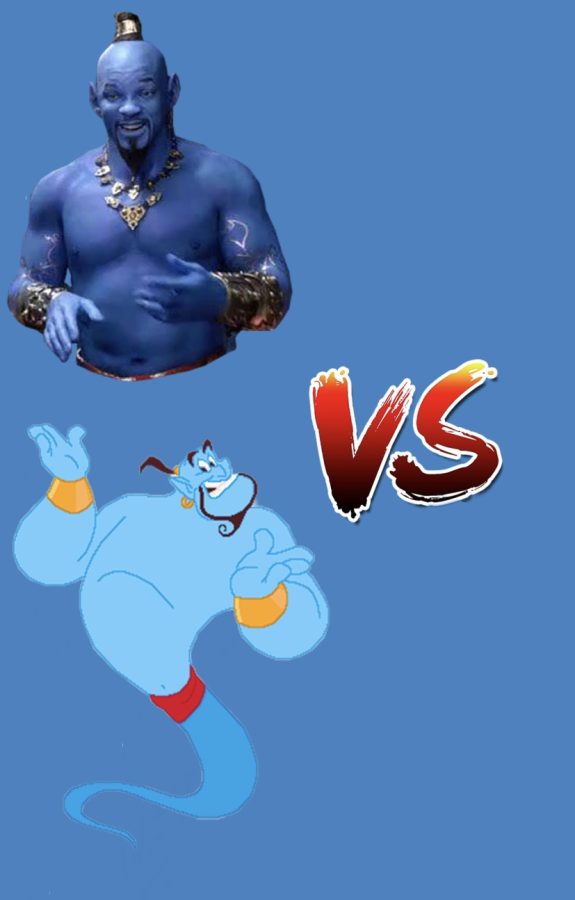It has been said numerous times before, “If it’s not broke, don’t fix it,” or, “Nothing beats the beloved classic.” If these sayings are true, why do movie companies continue to remake old films? Instead of creating a brand new movie, many companies have been recreating movies that feature the same plot line but different faces.
People across the world love rewatching movies they have grown up on or television shows they love, and with streaming services, it has become even easier for fans to do so. Although they are aware of every line and how it will end, it does not stop them from continuing to replay old favorites over and over again. The sense of familiarity that comes with rewatching allows the viewer to feel comfortable and relaxed.
The feelings created by rewatching shows come from a deeper connection rooted in nostalgia. While viewing a film, audiences make connections with the time period, personal relationships or the underlying plot itself, all of which produce an almost hypnotic happiness and warmth. Not only does nostalgia keep viewers coming back, but the mere-exposure effect causes viewers to develop a preference for things they are more familiar with, or have watched more of, meaning many people are more likely to rewatch and remain in the same realm of film genres.
Senior Carson Meenan is a part of the film club and loves to encover connections between film and the real world, “People are attracted to watching a film that has already been created as a way to understand what made it so special,” he said. “But another reason is that people are attracted to films using the same story, but different characters. People were attracted to Batman because it was a whole new interpretation. It seemed as if it was embracing its goth tone, while also making Batman in costume feel like an actual human being with feelings. We are constantly telling the same stories, but we can tell them in our own ways and embrace them.”
Film industries are able to profit off of those who rewatch motion pictures over and over again by simply creating a reboot of an already created film. Companies are able to use the exact same formula with different characters to create a theater-ready film to bring in more revenue. Multi-million dollar companies that are already thriving can quickly increase their success by targeting certain audiences.
Over time, the film industry has improved in their film and screen quality and now there has been a realization that producers can remake movies, but this time in better quality. Studios such as Disney, Universal, Paramount and countless others, started off their careers with animations. They were able to bring their drawings to life on the screen, but now directors are able to convert their old ideas into high quality live-action films. Remakes of animations have become major hits, practically wiping the floor with the originals. Disney’s live-action Beauty and the Beast and Aladdin have both made major headway for the world of remakes by bringing in more money and outstanding reviews than the classic cartoons.
Senior Taheera Amra has grown up watching animated films but now it seems like the animations are becoming live-actions, “I have personally really enjoyed watching remakes of my childhood movies. It feels like the movies are growing with me, not to mention I love seeing how different directors interpret the same film,” she stated. “Although I’m not sure if the directors recreate older films for the viewers or to make a profit. As much as I want to hope their main reason is for the fans, I know realistically money is a large factor.”
Everyone loves a good remake of a childhood movie, but what is the real reason companies are willing to spend the money on something that has already been created?
The film industry is based on profit confidence, meaning a company would not spend the money and time on a movie if they did not believe in its success. Companies have more faith in the performance of remakes rather than brand-new films due to the strong audience that has already been built. They are able to base their business on nostalgic franchises that have succeeded in the past and continue to do so today. If they were able to make the original a hit, chances are they can do it again – but this time for a whole new generation.
Remakes bring in a higher profit than the original films and completely take over box office sales. The incredibly high success rate leaves companies wanting to keep recreating older movies, but not all can be hits.
Senior film club member Ethan Kilcoin has enjoyed watching and analyzing film for much of his life. “Remakes can go one of two ways: they can be a carbon copy of the original – a cheap cop out used to make a quick buck – or they can take a new and unique approach to a timeless classic,” he explained. “When I am watching a film, the part I value the most is what the film is saying. If a film or remake is made without a purpose or just for the purpose of making profit, the film will not resonate with me on a personal level.”
Even with the strenuous amount of work companies put into remaking movies, some of them are not able to hit the target. A failed remake ultimately leads to more harm than benefit for not only the profits of that one film, but the company as a whole with the harsh commentary. Critics around the world are quick to create opinions for others, the truth is a review makes all the difference. By not having directors meet the expectations of viewers or inaccurately portray the original, they will end up losing more money than they spent.
Movies are a way for directors to express themselves through the acting of others, but it seems as though there are fewer and fewer creative directors willing to try something new, rather than a typical remake. Companies and directors have become hyper focused on the money aspect of film, rather than the innovative part. Still, the critical question remains: Do remakes ruin the art of filmmaking or does it allow for a different approach to an already successful film?










